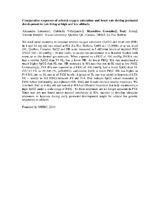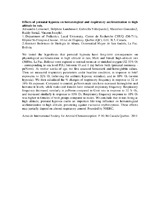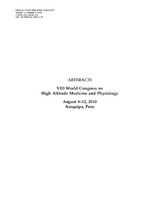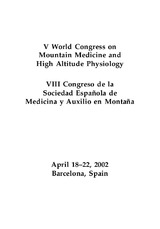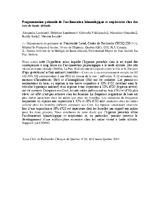Browsing Facultad de Medicina, Enfermería, Nutrición y Tecnología Médica by Subject "RATAS"
Now showing items 1-6 of 6
-
Comparative responses of arterial oxygen saturation and heart rate durign postnatal development in rats living at high and low altitude
(Actas Club Recherché Clinique de Quebec, 2011)We used pulse oximetry to measure arterial oxygen saturation (SpO2) and heart rate (HR) in 4 and 14 day-old rats raised at HA (La Paz, Bolivia, 3,600 m / 12,000ft) or at sea level (SL, Québec, Canada). SpO2 and HR were ... -
Effects of prenatal hypoxia on hematological and respiratory acclimatization to high altitude in rats
(Actas Club Recherché Clinique de Quebec, 2011)We tested the hypothesis that prenatal hypoxia have long-term consequences on physiological acclimatization to high altitude in rats. Male and female high-altitude rats (3600m, La Paz, Bolivia) were exposed to normal ... -
Hematocrit and hemoglobin levels at adulthood are determined by neonatal hypoxic exposure in rats living at high altitude
(High Altitude Medicine & Biology, 2010-08-08)Introduction: In previous work performed at sea level we reported that exposure to neonatal hypoxia impairs ventilatory and hematological responses to chronic hypoxia later in life. These findings supported the hypothesis ... -
Lactate dehydrogenase changes in diferent tissues in a chronical hypoxia adapted rat strain
(High Altitude Medicine & Hygiene, 2002-04-18)We have previously shown that the maximal anaerobic power of highlander-bolivian children is more affected by their nutrition status rather than by altitude. To further link these observations to molecular measurements, ... -
Life-long consequences of postnatal normoxia exposure in rats raised at high altitude
(J Appl Physiol, 2012-03-13)We tested the hypothesis that exposure of high-altitude (HA) rats to a period of postnatal normoxia has long-term consequences on the ventilatory and hematological acclimatization in adults. Male and female HA rats (3,600 ... -
Programmation prénatale de l'acclimatation hématologique et respiratoire chez des rats de haute altitude
(Actas Club Recherché Clinique de Quebec, 2011)Nous avons testé l’hypothèse selon laquelle l’hypoxie prénatale chez le rat aurait des conséquences à long terme sur l’acclimatation physiologique à la haute altitude. Des rats vivant en haute altitude (3600m, La Paz, ...

